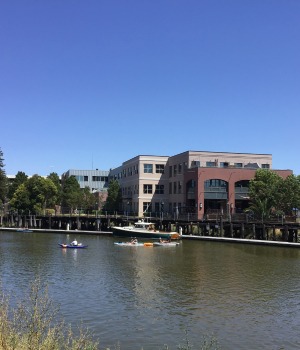Substance Abuse and Overdose Statistics in Petaluma, CA
In 2021, Sonoma County, which includes Petaluma, reported 109 drug overdose deaths that involved fentanyl.2 Here is a breakdown of additional drug and alcohol use statistics affecting the health in both Petaluma and Sonoma County:3,4
- In 2021, Sonoma County reported 122 opioid overdose-related deaths and 276 emergency department visits related to opioid overdose.
- Most of the deaths occurred in residents between 30 and 39 years old.
Levels of Care for Substance Abuse
Multiple levels of care exist for alcohol and drug rehab in California. Some residents require all levels of care during their journey to recovery, while others receive only the less intensive options.
Medical Detox
Detox is the process of safely and comfortably removing drugs or alcohol from your system while in a supervised medical setting. Many people choose a medical detox program to prevent severe withdrawal symptoms. This is often the first step in the recovery process, completed before transitioning into formal inpatient addiction treatment services.
Inpatient Care
An inpatient or residential setting involves living at an accredited rehab facility 24/7 to receive treatment for addiction. A combination of evidence-based interventions are provided, including individual and group therapy, nutritional counseling, and medication administration.
Partial hospitalization programs (PHPs)
PHPs are a type of outpatient treatment in California that often involve many of the same therapies and methods of inpatient care. The difference being that you only visit the drug rehab during scheduled session times, then you can return home.
Intensive Outpatient Programs (IOPs)
A step down from PHPs, IOPs are a type of outpatient treatment in California allowing you to attend onsite sessions for several hours a day, multiple days each week, while spending the rest of your time at home, working, or fulfilling other obligations.
Standard Outpatient
As the least intensive setting, standard outpatient care is appropriate for California residents who are highly motivated and have a strong support system. It involves just one or two hours of treatment per week.
Relapse Prevention
Aftercare, or relapse prevention, provides ongoing support after a rehab program is complete. Aftercare may include 12-step groups, non-12-step groups like SMART Recovery, ongoing therapy, sober living homes, and more.
How to Pay for Substance Abuse Treatment in California
Private Insurance
Every insurance provider in the U.S. is required by law to provide at least some coverage for mental health and substance abuse treatment. In California, residents should contact their insurance provider to confirm specific coverage with their carrier, including applicable copays.
Medi-Cal
Medi-Cal is California’s Medicaid program. Funded by federal and state taxes, this program pays for medical services for children and adults who have limited income. To qualify for Medi-Cal, California residents must meet income requirements and be one of the following: pregnant, responsible for a child under 21 years old, blind, disabled or a disabled family member, or 65 years or older.
California Medicare
California Medicare is a government program providing coverage to residents who are over the age of 65 or who have end-stage renal disease. California residents can use Medicare to cover the cost of rehab and other addiction treatment services; however, not all rehabs accept Medicare insurance.
Sliding Scale Payment Options
Sliding scale payment plans only charge California residents what they can afford, based on their income. To qualify, residents typically need to provide proof of income and assets.
TRICARE in California
California TRICARE (West Region) is a government program that provides health insurance for military personnel, veterans, and their dependents. TRICARE coverage includes addiction treatment services, such as rehab and medication-assisted treatment (MAT).
IHS-Funded Drug Rehabs
Drug rehab programs funded by the Indian Health Service provide free addiction treatment to California Natives and Indigenous peoples in the U.S.

Traveling to and Within Petaluma, CA
Petaluma is just a 45-minute drive from San Francisco. If you’re looking for a drug rehab or alcohol rehab away from the hustle of the city, Petaluma may offer the right treatment option for you.
Here is some helpful information about the city, whether you’re considering a Petaluma drug or alcohol rehab or visiting someone who is receiving addiction treatment at an inpatient, outpatient, or detox center:
- Sonoma County Airport Express buses will take you from Petaluma to the nearest major airports, San Francisco International Airport and Oakland International Airport.
- U.S. Highway 101 is the main freeway that runs through Petaluma.
- Petaluma offers plenty of bus services. These include Petaluma Transit, Golden Gate Transit, and Sonoma County Transit. The Sonoma-Marin Area Rail Transit (SMART) rail is also available and has a Petaluma-Downtown station.
- Petaluma’s downtown is listed on the National Register of Historic Places and offers some of the best examples of iron-front architecture in the country.
- Explore the Petaluma River by kayak or paddle board.
- The Cinnabar Theater is housed in a 1908 two-room schoolhouse and regularly offers live opera, drama, and musical performances. The Mystic Theater was built in 1911 and hosts an eclectic mix of artists today.
- Petaluma offers many family-friendly paved paths through the wetlands. Shollenberger Park features 165 acres of wetlands along with 5 miles of walking and bicycle paths. It’s also a favorite spot for bird watchers.
- Grab your bike and head out on the trails. Sonoma County is often called one of the best cycling destinations in the world. You can even bring your bike on the SMART train for a day trip.
- There are plenty of hiking options as well at the Helen Putnam Regional Park or the Tolay Lake Regional Park.
- If the ocean is your thing, Petaluma is located just a short drive away from the northern California coast.
- There’s no shortage of places to stay in and around Petaluma, from national-chain options to more boutique hotels.
California Alcohol and Drug Laws
California law includes the following policies related to substance abuse:1,2,3,4,5
California Employee Protections for Drug or Alcohol Rehab: California’s labor code requires employers with 25 or more employees to provide accommodation to staff who voluntarily choose to attend alcohol or drug rehab. This may include unpaid time off or use of sick or vacation time. Employees who wish to request time off for addiction treatment may be able to request it under the Family and Medical Leave Act or the California Family Rights Act.
Substance Abuse and Crime Prevention Act: This act provides treatment opportunities for individuals who are convicted of non-violent crimes. Eligible offenders may serve their time in drug treatment rather than in prison.
California Government Prevention and Care Services: Senate Bill 110 expanded these services to include contingency management (an incentivized treatment program) as a benefit covered under Medi-Cal. Patients who demonstrate substance-free behavior, such as drug-free urine tests, are rewarded with vouchers or gift cards.
California Ethical Treatment for Persons with Substance Use Disorder Act: This bill protects residents undergoing addiction treatment by requiring alcohol and drug rehabs in California to adopt a client bill of rights that seeks to ensure every client is are treated with dignity, honesty, and respect.
California’s Good Samaritan Law: This law encourages California residents to call 9-1-1 if an overdose is suspected. It protects individuals who seek emergency medical care for overdose from legal repercussions for possession of a controlled substance/drug paraphernalia or providing alcohol to minors.
Resources
- Petaluma City Schools. (2021). Opioids and Fentanyl in our Community: An Information Night for Parents, Families, and Adult Allies.
- Sonoma County District Attorney. (2022). Fentanyl Awareness Outreach Campaign Begins.
- California Department of Public Health. (n.d.). California Overdose Surveillance Dashboard.
- University of Wisconsin Population Health Institute. (2022). County Health Rankings – Sonoma County.


